仁爱英语九年级上过去分词归纳
仁爱版九年级英语上册第二单元U2T2知识点归纳

仁爱版九年级英语上册第二单元U2T2.知识点归纳Topic 2 How does pollution hurt the earth?一、重点词汇(一)词形变换1. none (反义词) all2. both (反义词) neither3. rubbish (同义词) litter4.steal (过去式) stole (过去分词) stolen 5. spit (过去式;过去分词) spat6. behave (名词) behavior7. prevent (同义词) stop8. although (同义词)though 9. pollute (句词) pollution 10. completely (形容词) complete (二)重点词组1.read this article 看这篇文章2.here and there = everywhere 到处3.care for = look after = take care of 照顾4.give some advice to …提出一些建议给……5.set one’s mind to sth. 集中精力于……; 用心于……6.protect nature 保护自然7.wash away 冲走8.blow away 吹走;刮走9.turn into = change into 转变成10.die out 灭绝;绝迹11.stop / prevent …(from) doing sth. 阻止……做某事12.keep…from doing sth. 阻止……做某事13.move toward…朝……移动14.cut down 砍倒15.run away 跑走; 流走16.cut off 中断17.on the earth 在地球上18.be in danger of (doing) sth. 处于做某事的危险中19.destroy/ harm/ pollute the environment 破坏/损害/污染环境20.have a quiet life 过着平静的生活21.plenty of 大量的22.come to realize 开始意识23.have a clean-up 大扫除24.one after another 一个接着另一个25.on recycled paper 在再生纸上26.enter the competition 进入比赛27.offer one’s suggestion 提供某人的建议二、重点句型1.But the government has done something useful to protect the environment.但政府为了保护环境已做了一些有益的事。
(完整版)仁爱英语九年级上册知识点归纳
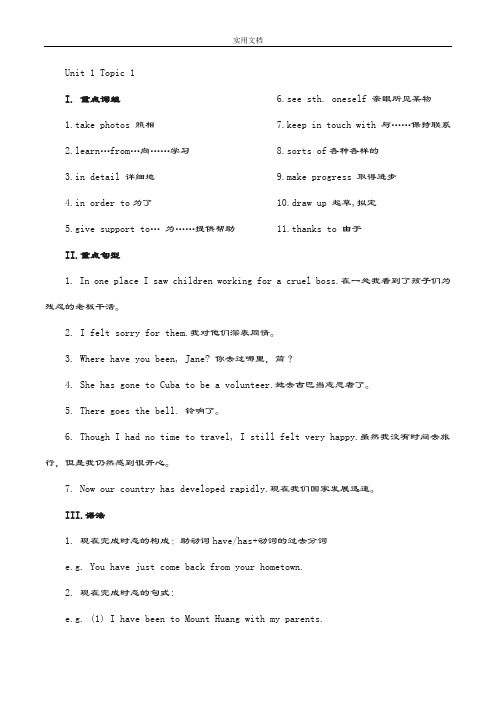
Unit 1 Topic 1I. 重点词组1.take photos 照相2.learn…from…向……学习3.in detail 详细地4.in order to为了5.give support to…为……提供帮助6.see sth. oneself 亲眼所见某物7.keep in touch with 与……保持联系8.sorts of各种各样的9.make progress 取得进步10.draw up 起草,拟定11.thanks to 由于II.重点句型1. In one place I saw children working for a cruel boss.在一处我看到了孩子们为残忍的老板干活。
2. I felt sorry for them.我对他们深表同情。
3. Where have you been, Jane? 你去过哪里,简?4. She has gone to Cuba to be a volunteer.她去古巴当志愿者了。
5. There goes the bell. 铃响了。
6. Though I had no time to travel, I still felt very happy.虽然我没有时间去旅行,但是我仍然感到很开心。
7. Now our country has developed rapidly.现在我们国家发展迅速。
III.语法1. 现在完成时态的构成:助动词have/has+动词的过去分词e.g. You have just come back from your hometown.2. 现在完成时态的句式:e.g. (1) I have been to Mount Huang with my parents.(2) I haven’t seen him for a long time.(3) Where have you been?(4) ——Have you ever cleaned a room? ——Yes, I have. / No, I haven’t.3. have/ has been与 have/has gone 的区别have/has been to sp.表示曾经到过某地—— have/has gone to sp.表示已经去了某地e.g. (1) I have been to Mount Huang with my parents. (2) She has gone to Cuba to be a volunteer.Unit 1 Topic 2I. 重点词组1. get lost 迷路2. each other 彼此3.at least 至少4take place发生5because of 因为6.be strict with sb. 对某人严格要求7.carry out 实行8.be short of 缺乏9.take measures to do sth.采取措施做某事10.be known as…作为……而著名11.work well in doing…在……方面起作用12.a couple of 一些13keep up with赶上,跟上II.重点句型1. Have you found him yet? 你已经找到他了吗?2. ——I really hate to go shopping. 我的确讨厌购物。
仁爱版英语九年级上册知识点总结汇总
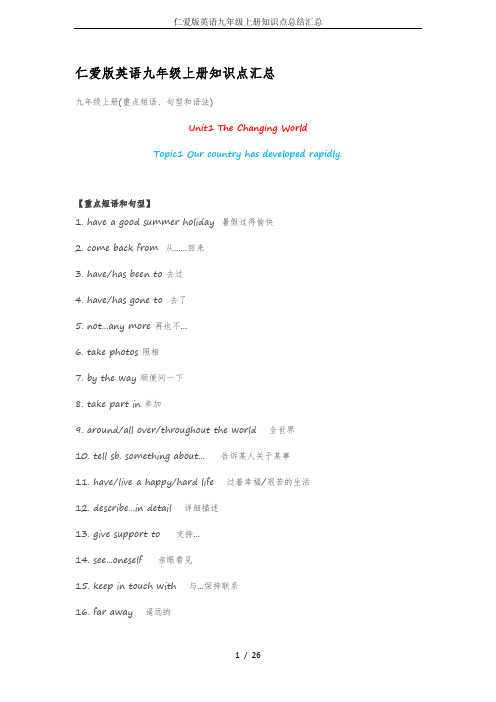
仁爱版英语九年级上册知识点汇总九年级上册(重点短语、句型和语法)Unit1 The Changing WorldTopic1 Our country has developed rapidly.【重点短语和句型】1. have a good summer holiday 暑假过得愉快2. come back from 从......回来3. have/has been to 去过4. have/has gone to 去了5. not...any more 再也不...6. take photos 照相7. by the way 顺便问一下8. take part in 参加9. around/all over/throughout the world 全世界10. tell sb. something about... 告诉某人关于某事11. have/live a happy/hard life 过着幸福/艰苦的生活12. describe...in detail 详细描述13. give support to 支持...14. see...oneself 亲眼看见15. keep in touch with 与...保持联系16. far away 遥远的17. kinds/sorts of 各种各样的...18. not only...but also 不仅...而且...19. make progress 取得进步20. more than/over 多于21. develop/improve rapidly 迅速发展/改善22. tell sb. (not ) to do sth. 告诉某人(别)做某事23. ask sb. (not ) to do sth. 要求某人(别)做某事24. in order to do sth. 为了做某事25. have to do sth. 不得不做某事26. It's +形容词+for sb. to do sth. 对于某人来说做某事是...的27. why not do sth.=why don’t you do sth为什么不做某事28. succeed/be successful in doing sth. 成功地做某事29. dream about doing sth. 梦想做某事30. see/hear sb. do/doing sth. 看见/听见某人做/正在做某事【重点语法】现在完成时一. 现在完成时的基本结构肯定句:主语+have/has+Ved (动词的过去分词)+其他否定句:主语+have/has+not+Ved (动词的过去分词)+其他一般疑问句:Have/Has+主语+Ved (动词的过去分词)+其他特殊疑问句:特殊疑问词+一般疑问句语序(have/has+主语+过去分词+其他),把划线词去掉二. 现在完成时的用法态发生在过去但它的影响现在还存在,强调的是现在。
九上仁爱版英语期末复习知识点总结

九上仁爱版英语期末复习知识点总结九上期末考试复习提纲一、重点单词1. develop v.发展→development n.发展→developed adj.发达的→developing adj.发展中的2. rapid adj. 快速的→ rapidly adv. 快速地(动副结构)3. abroad 国外hardly 几乎不respect尊敬discover 发现produce产生disturb打扰reduce 减少behavior 行为punish 惩罚Destroy 破坏thirsty 口渴浪费waste工业,产业industry create 创造若干several鼓励encourage guide 向导[ˈsevrəl] several [səˈpɔ:t] support4. succeed v. 成功→ success n.成功→ successful adj. 成功的→successfully adv. 成功地(动副结构,be+形容词,have/has+done)5. communicate v. 交流→ communication n.通讯;交流6. satisfy v.使满意→satisfied adj. 满意的7. medical adj. 医疗的→ medicine n.药8. 包括include9. recent adj. 近来的→ recently adv. 最近(动副结构)10. German→复数Germans11. luck n 运气→lucky adj. 幸运的→luckily adv. 幸运地12. nod点头→nodded (过去式) nodding (现在分词)13. 增加v. increase14. 到达,达到arrive15. control v. 控制→controlling (现在分词)→controlled (过去式/过去分词)16. difficult adj. 困难的→difficulty n. 困难→difficulties(pl.)17. home n. 家→homeless adj. 无家的→homelessness n. 无家可归18. 当地的19. steal v.偷→stole (过去式)→stolen (过去分词)20. important adj.重要的→ importance n.重要性the importance of ...的重要性21. pollution n. 污染→ pollute v. 污染22. breathe v. 呼吸→ breath n.一次吸入的空气;呼吸23. rise上升→ 过去式rose → 过去分词risen24. visit→ 参观者25.an excellent student26.different adj. 不同的→difference n. 差别(复数)27. agree v. 同意→agreement n.同意;一致→ disagreement n.不同意;不一致→disagree v.不同意28. protect v. 保护29. organize v.30. avoid v.避免(avoid doing sth.)31. escape v. 逃跑32. although/though conj.(连词) 虽然,尽管,即使33. none pron. 没有一个(表示三者或三者以上没有一个)→ all(反义词)34. hide hid(过去式)hidden(过去分词)二、重点短语1. so….that…. 如此….以至于典例:( )1). ---The film Tiny Times is interesting I would like to see it again.---Let’s go to the movies this weekend.A.so, thatB. such, thatC. too, to( )2). ---- Lucy, you look tired today. What’s wrong?----- I was ______ busy _____ I stayed up late last night.A. too, toB. such, thatC. so, that2. take place 发生3. have no time to do sth. 没有时间做某事4. put on 穿上;上演---put on funny shows 表演有趣的节目5. see sth. oneself 亲眼看见6. keep in touch with 与……保持联系7. far away 遥远8. be crowded into 挤在9. satisfy people’s needs 满足人们的需要10.make progress 取得进步11. succeed in doing sth. 成功地做了某事12. play an important part in 在….方面起重要作用13. in one’s spare/free time 在某人空闲时间14. go abroad 去国外15. with the development of 随着……的发展16.in the past 在过去17.living conditions 生活条件18.receive a good education 获得良好的教育19.medical care 医疗保健20.by the way 顺便问一下21.have a chance to do sth 有机会做某事22. have a population of 有….人口23. increase by/to 增加了/增加到典例()The population has increased more than seven million. It has increased 20%.A. to; toB. to; byC. by; to24. carry out 实行25.so far 到目前为止26. take measures to do sth.采取措施做某事27. be known / famous as 作为……而闻名28. work well in doing sth. 在做某事方面很有功效29.thanks to 幸亏;由于30. be surrounded by 被….所环绕31. discourage doing 阻止做某事32.what’s more 而且33.get lost=be lost 迷路34.one-child policy 独生子女政策35.supply sb. with sth.==supply sb to sth =provide sb.with sth.= provide sth for sb =offer sb. sth.=offer sth. to sb. 提供某人某物36.as a matter of fact =in fact 事实上,实际上lions of 数以百万计的\ hundreds of 数以百计的\ thousands of 成千上万38.decide on选定,选择\decide to do sth 决定做某事\ make a decision 做决定39. in need 在困难时,在贫困之中40.be\get used to (doing) sth 习惯于(做)某事→used to do sth 过去常常做某事()My brother _______ like collecting stamps. But now he _______collecting coins.A. used to, got used toB. got used to, used toC. used to, gets used to41.on purpose 故意地,有意地42.according to 据……所说,按……所报道43.live / have a normal life 过着正常的生活44.make a contribution to 为......作出贡献45.as a result 结果,因此46.encourage sb. to do sth. 鼓励某人做某事47.manage to do 设法做谋事48.think of...as... 把…看作三、知识点:1. There were so many people that I couldn’t find a good place to take photos. 那里人太多了以至于我找不到一个好的地方拍照。
仁爱英语九年级上册知识点归纳【九篇】
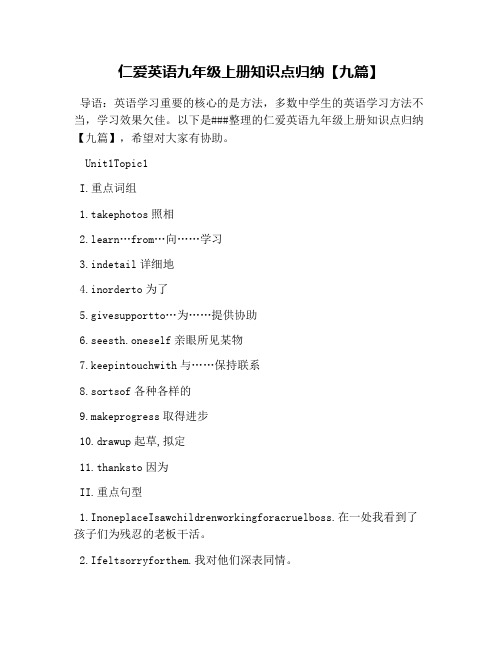
仁爱英语九年级上册知识点归纳【九篇】导语:英语学习重要的核心的是方法,多数中学生的英语学习方法不当,学习效果欠佳。
以下是###整理的仁爱英语九年级上册知识点归纳【九篇】,希望对大家有协助。
Unit1Topic1I.重点词组1.takephotos照相2.learn…from…向……学习3.indetail详细地4.inorderto为了5.givesupportto…为……提供协助6.seesth.oneself亲眼所见某物7.keepintouchwith与……保持联系8.sortsof各种各样的9.makeprogress取得进步10.drawup起草,拟定11.thanksto因为II.重点句型1.InoneplaceIsawchildrenworkingforacruelboss.在一处我看到了孩子们为残忍的老板干活。
2.Ifeltsorryforthem.我对他们深表同情。
3.Wherehaveyoubeen,Jane?你去过哪里,简?4.ShehasgonetoCubatobeavolunteer.她去古巴当志愿者了。
5.Theregoesthebell.铃响了。
6.ThoughIhadnotimetotravel,Istillfeltveryhappy.虽然我没有时间去旅行,但是我仍然感到很开心。
7.Nowourcountryhasdevelopedrapidly.现在我们国家发展迅速。
III.语法1.现在完成时态的构成:助动词have/has+动词的过去分词e.g.Youhavejustcomebackfromyourhometown.2.现在完成时态的句式:e.g.(1)IhavebeentoMountHuangwithmyparents.(2)Ihaven’tseenhimforalongtime.(3)Wherehaveyoubeen?(4)——Haveyouevercleanedaroom?——Yes,Ihave./No,Ihaven’t.3.have/hasbeen与have/hasgone的区别have/hasbeentosp.表示以前到过某地——have/hasgonetosp.表示已经去了某地e.g.(1)IhavebeentoMountHuangwithmyparents.(2)ShehasgonetoCuba tobeavolunteer.Unit1Topic2I.重点词组1.getlost迷路2.eachother彼此3.atleast至少4takeplace发生5becauseof因为6.bestrictwithsb.对某人严格要求7.carryout实行8.beshortof缺乏9.takemeasurestodosth.采取措施做某事10.beknownas…作为……而11.workwellindoing…在……方面起作用12.acoupleof一些13keepupwith赶上,跟上II.重点句型1.Haveyoufoundhimyet?你已经找到他了吗?2.——Ireallyhatetogoshopping.我的确讨厌购物。
仁爱英语九年级上册U1T1-2要点

仁爱英语九年级上册U1T1-2要点Unit1Topic11.Our country has developed rapidly.develop—n. 发达的:发展中的:rapid—adj.2.Rita, you have just come back from your hometown.现在完成时态标志性词汇:3.Great changes have taken place there and my hometown has become more and morebeautiful.take—(过去式)(过去分词)take place 发生越来越胖越来越重要越来越热越来越困难4.But there were so many people that I couldn’t find a proper place to take photos.5.I have been to an English summer school to improve my English.6.By the way, where’s Maria?----She has gone to Cuba to be a volunteer…..have been to/have gone to/have been in 的区别7.There goes the bell.8.You have taken part in some volunteer activities during the summer holidays, haven’t you?take part in和join的区别复习反意疑问句9.Have you ever fed them?ever“曾经”,多用于疑问句。
never “从不”,多用于否定陈述句。
常用来回答ever的句型。
Has he ever been abroad?----No, never.before “之前”,一般位于句末,常与never 呼应。
仁爱英语九年级上册语法精讲(二)

仁爱英语九年级上册语法精讲(二)同学们,小编给大家整理了仁爱英语九年级上册的语法知识,这部分语法知识一共分两期。
这一期是Unit4~6的语法精讲。
希望对你们英语学习有所帮助。
另外大家在后台的留言小编都认真看了,今后会尽量以文字形式进行编辑,方便大家保存1Unit 4-topic1一般过去时的被动语态一般过去时的被动语态:谓语部分的基本形式是:be动词的过去式was/were+及物动词的过去分词。
e.g.When was it made? 它是什么时候制造的?It was made in 1980.它是1980年制造的。
When was the digital camera invented?数码相机是什么时候发明的?It was invented in 1975.它是1975年发明的。
When were these flowers watered?这些花是什么时候浇的?They were watered this morning. 它们是今天早上浇的。
1.陈述句:e.g.The PRC was founded in 1949.中华人民共和国成立于1949年。
2.疑问句:e.g.Was it made in China?它是中国制造的吗?Where was the computer made?那台电脑是哪儿制造的?3.否定句:e.g.Her books weren’t stolen yesterday.昨天她的书没被偷走。
Unit 4-topic2一般将来时的被动语态一般将来时态的被动语态是由“will+be+及物动词的过去分词”构成。
e.g. What will be built on the Mars?什么将会被建造在火星上?My homework will be finishedsoon.我的作业将很快就完成了。
一般将来时的被动语态变否定句要在助动词will后面加not。
把助动词will提到句首,便成了一般疑问句。
仁爱版英语不规则动词的过去式和过去分词变化表
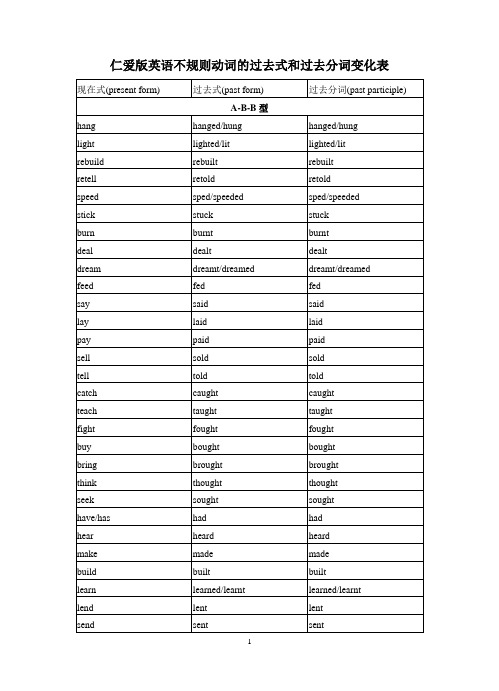
frozen overeaten proven
shake sink wake awake blow draw sing ring drink spring begin swim speak steal break choose bite hide bear tear wear swear rise drive ride write take mistake know grow throw fly
go do give forgive forget see eat fall lie show be(am, is, are)
cut fit put set shut spit spread bet cost hit hurt let read
beat
shall will can may
went
gone
仁爱版英语不规则动词的过去式和过去分词变化表
现在式(present form)
hang light rebuild retell speed stick burn deal dream feed say lay pay sell tell catch teach fight buy bring think seek have/has hear make build learn lend send
3
shaken sunk woken awoken blown drawn sung rung drunk sprung begun swum spoken stolen broken chosen bitten hidden born torn worn sworn risen driven ridden written taken mistaken known grown thrown flown
仁爱英语九年级上册各单元知识点归纳汇总
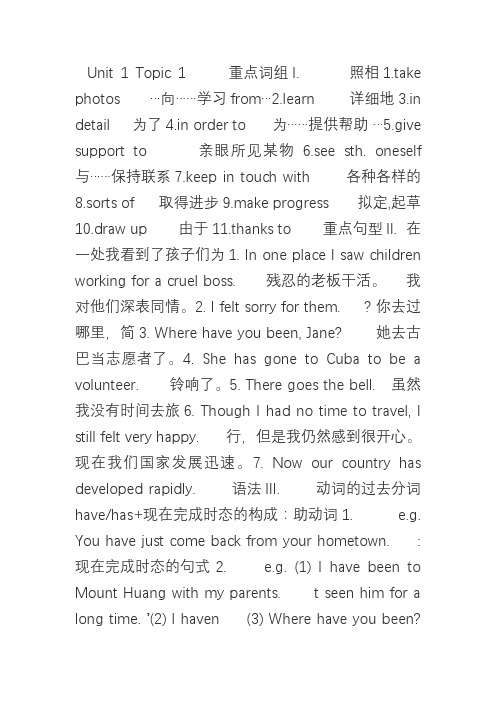
Unit 1 Topic 1 重点词组I. 照相1.take photos …向……学习from…2.learn 详细地3.in detail 为了4.in order to 为……提供帮助…5.give support to 亲眼所见某物 6.see sth. oneself 与……保持联系7.keep in touch with 各种各样的8.sorts of 取得进步9.make progress 拟定,起草10.draw up 由于11.thanks to 重点句型II. 在一处我看到了孩子们为1. In one place I saw children working for a cruel boss. 残忍的老板干活。
我对他们深表同情。
2. I felt sorry for them. ? 你去过哪里,简3. Where have you been, Jane? 她去古巴当志愿者了。
4. She has gone to Cuba to be a volunteer. 铃响了。
5. There goes the bell. 虽然我没有时间去旅6. Though I had no time to travel, I still felt very happy. 行,但是我仍然感到很开心。
现在我们国家发展迅速。
7. Now our country has developed rapidly. 语法III. 动词的过去分词have/has+现在完成时态的构成:助动词1. e.g. You have just come back from your hometown. :现在完成时态的句式2. e.g. (1) I have been to Mount Huang with my parents. t seen him for a long time. ’(2) I haven (3) Where have you been?——Have you ever cleaned a room? ——(4) t. ’Yes, I have. / No, I haven 的区别have/has gone 与3. have/ has been 表示已经去了某地 have/has goneto sp.表示曾经到过某地——have/has been to sp. 1e.g. (1) I have been to Mount Huang with my parents. (2) She has gone to Cuba to be a volunteer. Unit 1 Topic 2 重点词组I. 迷路1. get lost 彼此2. each other 至少3.at least 发生4take place 因为5because of 对某人严格要求6.be strict with sb. 实行7.carry out 缺乏8.be shortof 采取措施做某事9.take measures to do sth. …10.be known a s 作为……而著名…在……方面起作用11.work well in doing 一些12.a coupleof 跟上,赶上13keep up with 重点句型II. ? 你已经找到他了吗1. Have you found him yet? 我也如此。
仁爱版九年级英语上Unit one The Changing world Topic 1 Our country has developed rapidly Section A
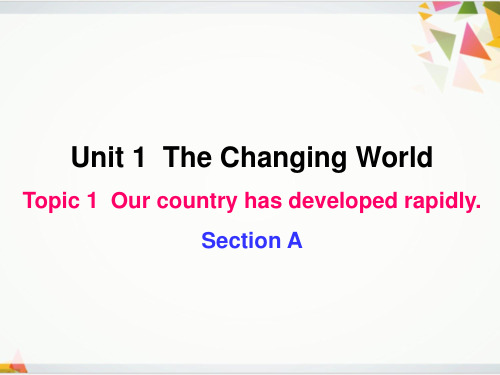
Mount Huustralia Africa London America
2a TLhisetennetoxtthedcaoyn,vMersaartiiaoncaanmd feillbinatchke .blSanhkes.mTheetn practice it withMyoicurhpaaertlneirn. the school.
I __h_a_v_e_f_in_i_s_h_e_d_ my English homework. 她已做好了晚饭。 Sheh_a_s__c_o_o_k_e_d the dinner.
Read these aloud:大声读、背(准备默写) 1.从、、回来: come back from…. 2. 发生: take place 3.如此多的人: so many people 4.如此多的钱: so much money 5.找到一个好地方: find a good place 6. 提高我的英语: improve my English 7.去过某地: have/has been to sw 8.去了某地: have/has gone to sw 9. 顺便提一下:by the way 10. 铃声响了: There goes the bell.
Read 1a by yourselves again.
1a Listen,look and say.
Can you find out the following sentences and
understand them? 1.You have just come back from your hometown.
1.他们去过上海。Thheya_v_e_ b_e_e_ n__toShanghai. 2.她去了上海。She _h_a_s_ g__o_n_e_t_o__Shanghai.
九年级上册知识点归纳(仁爱版英语九年级)
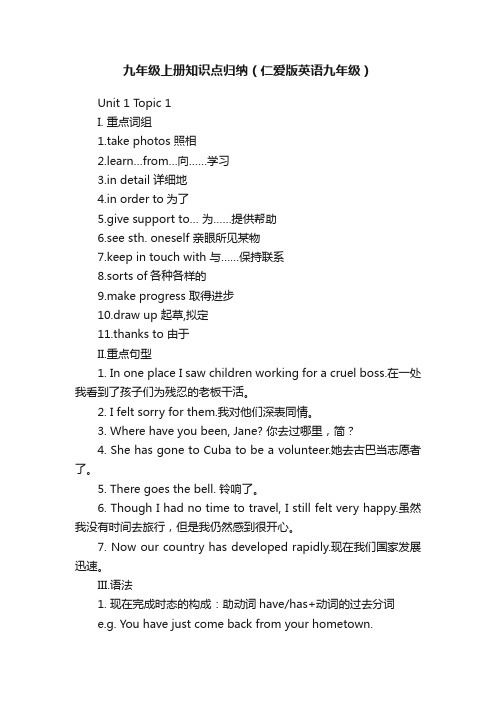
九年级上册知识点归纳(仁爱版英语九年级)Unit 1 Topic 1I. 重点词组1.take photos 照相2.learn…from…向……学习3.in detail 详细地4.in order to为了5.give support to… 为……提供帮助6.see sth. oneself 亲眼所见某物7.keep in touch with 与……保持联系8.sorts of各种各样的9.make progress 取得进步10.draw up 起草,拟定11.thanks to 由于II.重点句型1. In one place I saw children working for a cruel boss.在一处我看到了孩子们为残忍的老板干活。
2. I felt sorry for them.我对他们深表同情。
3. Where have you been, Jane? 你去过哪里,简?4. She has gone to Cuba to be a volunteer.她去古巴当志愿者了。
5. There goes the bell. 铃响了。
6. Though I had no time to travel, I still felt very happy.虽然我没有时间去旅行,但是我仍然感到很开心。
7. Now our country has developed rapidly.现在我们国家发展迅速。
III.语法1. 现在完成时态的构成:助动词have/has+动词的过去分词e.g. You have just come back from your hometown.2. 现在完成时态的句式:e.g. (1) I have been to Mount Huang with my parents.(2) I haven’t seen him for a long time.(3) Where have you been?(4) --Have you ever cleaned a room? --Yes, I have. / No, I haven’t.3. have/ has been与 have/has gone 的区别have/has been to sp.表示曾经到过某地-- have/has gone to sp.表示已经去了某地e.g. (1) I have been to Mount Huang with my parents. (2) She has gone to Cuba to be a volunteer.Unit 1 Topic 2I. 重点词组1. get lost 迷路2. each other 彼此3.at least 至少4take place发生5because of 因为6.be strict with sb. 对某人严格要求7.carry out 实行8.be short of 缺乏9.take measures to do sth.采取措施做某事10.be known as… 作为……而著名11.work well in doing…在……方面起作用12.a couple of 一些13keep up with赶上,跟上II.重点句型1. Have you found him yet? 你已经找到他了吗?2. --I really hate to go shopping. 我的确讨厌购物。
九年级上册仁爱英语Unit4topic1语言知识点讲解过去时态被动语态
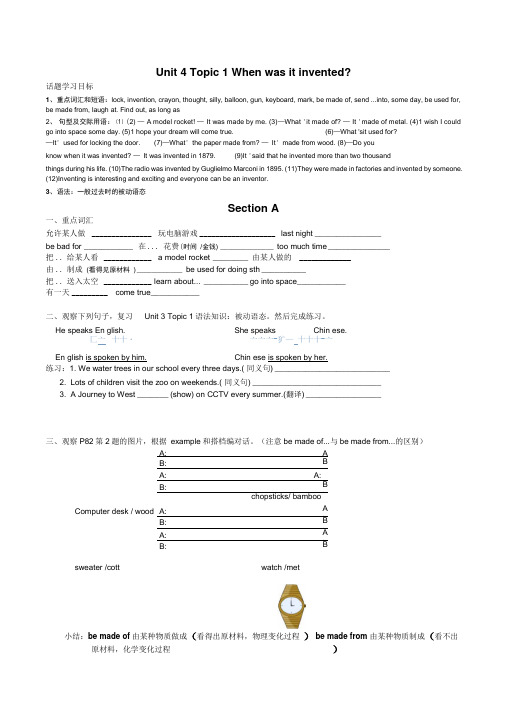
Unit 4 Topic 1 When was it invented?话题学习目标1、 重点词汇和短语:lock, invention, crayon, thought, silly, balloon, gun, keyboard, mark, be made of, send ...into, some day, be used for, be made from, laugh at. Find out, as long as2、 句型及交际用语: ⑴ (2) — A model rocket! — It was made by me. (3)—What 'it made of? — It 'made of metal. (4)1 wish I could go into space some day. (5)1 hope your dream will come true. (6)—What 'sit used for?—It ' used for locking the door.(7)—What ' the paper made from? — It ' made from wood. (8)—Do youknow when it was invented? — It was invented in 1879.(9)It 'said that he invented more than two thousandthings during his life. (10)The radio was invented by Guglielmo Marconi in 1895. (11)They were made in factories and invented by someone. (12)Inventing is interesting and exciting and everyone can be an inventor. 3、 语法:一般过去时的被动语态Section A一、重点词汇允许某人做 _______________ 玩电脑游戏 ___________________ last night _______________ be bad for ___________ 在 ... 花费(时间 /金钱) ______________ too much time ______________ 把 .. 给某人看 ____________ a model rocket ________ 由某人做的 _____________ 由 .. 制成 (看得见原材料 ) ____________ be used for doing sth __________ 把 .. 送入太空 ____________ learn about... __________ go into space___________ 有一天 _________ come true ___________ 二、观察下列句子,复习 Unit 3 Topic 1语法知识:被动语态。
仁爱版英语九年级上册Unit1 Topic2 语法小结

Unit1 Topic2 语法小结第一局部现在完成时表示过去发生或已经完成的动作对现在造成的影响或结果,也可表示过去已经开场,一直延续到现在的动作或状态。
学习现在完成时,先从构造和句式开场:构成:主语+ have/has + 过去分词+ 其他。
(当主语是第三人称单数时用has,其余人称用have。
过去分词:规那么动词的过去分词构成与动词过去式一样;不规那么动词需要特殊记忆。
)否认式:主语+ haven't/hasn't + 过去分词+ 其他。
疑问式: Have /Has + 主语+ 过去分词+ 其他?简单答语: Yes, 主语+ have/has.(肯定)No, 主语+ haven't/hasn't.(否认)第二局部现在完成时的含义之一是过去完成的动作对现在仍有影响,用以下四大标志词可以表达这种含义:以already, just和yet为标志already, just和yet 表示到现在为止动作或状态已经、刚刚或还没有发生。
以ever和never为标志ever和never 表示到现在为止动作或状态曾经或从来没有发生过。
以动作发生的次数为标志假设某一动作到现在为止已经发生了假设干次,那么要使用现在完成时。
以so far为标志so far往往表示到目前为止动作或状态已经发生。
第三局部过去已经开场的动作一直延续到现在, 甚至有可能继续延续下去,我们可以从动作“延续〞的特性和“时间〞点段的区分入手,进一步学习现在完成时。
英语中的动词从词义上可以分为延续性和非延续性两种,在现在完成时态中一定要注意动词这一特性,应将这类非延续性动词转换为延续性动词。
* 时间“点〞、“段〞须分清过去开场的动作可以延续到某一点完毕,也可能继续延续,这时就要根据时间“点〞、“段〞选择相应的介词for或since。
第四局部一、动词的过去分词形式:通常一个动词的过去分词和他的过去式是一样的,在动词后面加ed构成过去分词,但是有一些动词的过去分词有不规那么的形式。
仁爱英语九年级上过去分词归纳
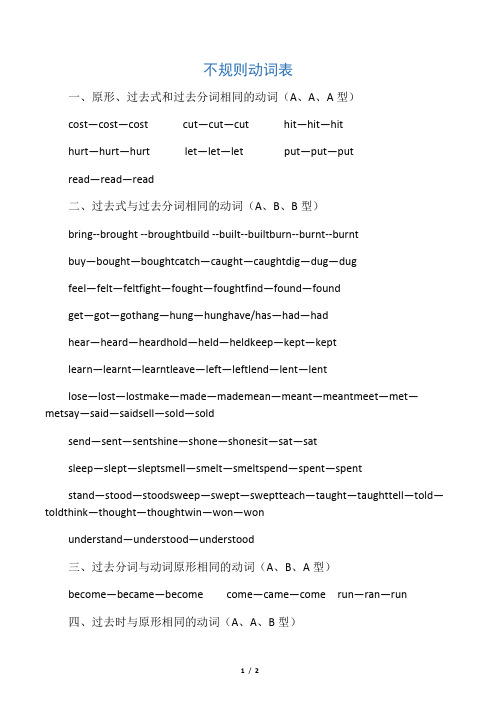
不规则动词表一、原形、过去式和过去分词相同的动词(A、A、A型)cost—cost—cost cut—cut—cut hit—hit—hithurt—hurt—hurt let—let—let put—put—putread—read—read二、过去式与过去分词相同的动词(A、B、B型)bring--brought --broughtbuild --built--builtburn--burnt--burntbuy—bought—boughtcatch—caught—caughtdig—dug—dugfeel—felt—feltfight—fought—foughtfind—found—foundget—got—gothang—hung—hunghave/has—had—hadhear—heard—heardhold—held—heldkeep—kept—keptlearn—learnt—learntleave—left—leftlend—lent—lentlose—lost—lostmake—made—mademean—meant—meantmeet—met—metsay—said—saidsell—sold—soldsend—sent—sentshine—shone—shonesit—sat—satsleep—slept—sleptsmell—smelt—smeltspend—spent—spentstand—stood—stoodsweep—swept—sweptteach—taught—taughttell—told—toldthink—thought—thoughtwin—won—wonunderstand—understood—understood三、过去分词与动词原形相同的动词(A、B、A型)become—became—become come—came—come run—ran—run四、过去时与原形相同的动词(A、A、B型)beat—beat—beaten must—must--五、原形、过去式和过去分词都不相同的动词(A、B、C型)Be (am/is)—was—beenbe(are)—were—beenBegin—began—begunblow—blew—blownbreak—broke—brokenCan—couldchoose—chose—chosendo—did—doneDraw—drew—drawndrink—drank—drunkdrive—drove—drivenEat—ate—eatenfall—fell—fallenforget—forgot—forgottenGive—gave—givengo—went—gonegrow—grew—grownKnow—knew—knownlie—lay—lainmay—might—Mistake—mistook—mistaken ride—rode—riddenring—rang—rungRise—rose—risensee—saw—seenshall—should—Speak—spoke—spokentake—took—takenwake—woke—wokenWill—wouldwrite—wrote—written。
(完整版)仁爱英语九年级上册知识点归纳
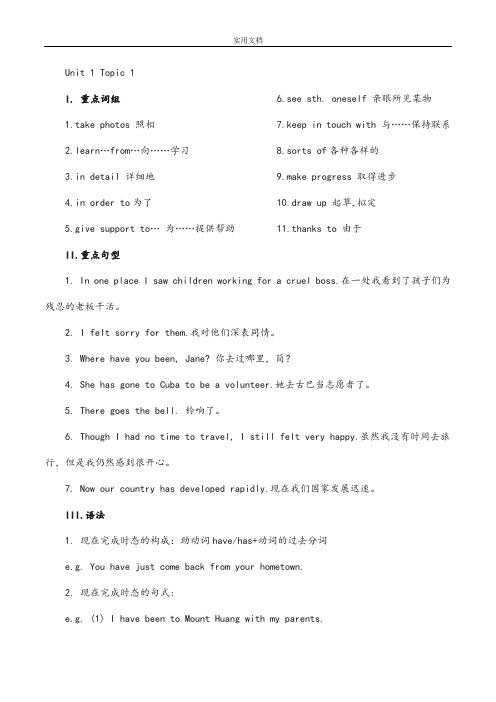
Unit 1 Topic 1I. 重点词组1.take photos 照相2.learn…from…向……学习3.in detail 详细地4.in order to为了5.give support to…为……提供帮助6.see sth. oneself 亲眼所见某物7.keep in touch with 与……保持联系8.sorts of各种各样的9.make progress 取得进步10.draw up 起草,拟定11.thanks to 由于II.重点句型1. In one place I saw children working for a cruel boss.在一处我看到了孩子们为残忍的老板干活。
2. I felt sorry for them.我对他们深表同情。
3. Where have you been, Jane? 你去过哪里,简?4. She has gone to Cuba to be a volunteer.她去古巴当志愿者了。
5. There goes the bell. 铃响了。
6. Though I had no time to travel, I still felt very happy.虽然我没有时间去旅行,但是我仍然感到很开心。
7. Now our country has developed rapidly.现在我们国家发展迅速。
III.语法1. 现在完成时态的构成:助动词have/has+动词的过去分词e.g. You have just come back from your hometown.2. 现在完成时态的句式:e.g. (1) I have been to Mount Huang with my parents.(2) I haven’t seen him for a long time.(3) Where have you been?(4) ——Have you ever cleaned a room? ——Yes, I have. / No, I haven’t.3. have/ has been与 have/has gone 的区别have/has been to sp.表示曾经到过某地—— have/has gone to sp.表示已经去了某地e.g. (1) I have been to Mount Huang with my parents. (2) She has gone to Cuba to be a volunteer.Unit 1 Topic 2I. 重点词组1. get lost 迷路2. each other 彼此3.at least 至少4take place发生5because of 因为6.be strict with sb. 对某人严格要求7.carry out 实行8.be short of 缺乏9.take measures to do sth.采取措施做某事10.be known as…作为……而著名11.work well in doing…在……方面起作用12.a couple of 一些13keep up with赶上,跟上II.重点句型1. Have you found him yet? 你已经找到他了吗?2. ——I really hate to go shopping. 我的确讨厌购物。
仁爱版九年级初三英语上册各单元重要知识点汇总
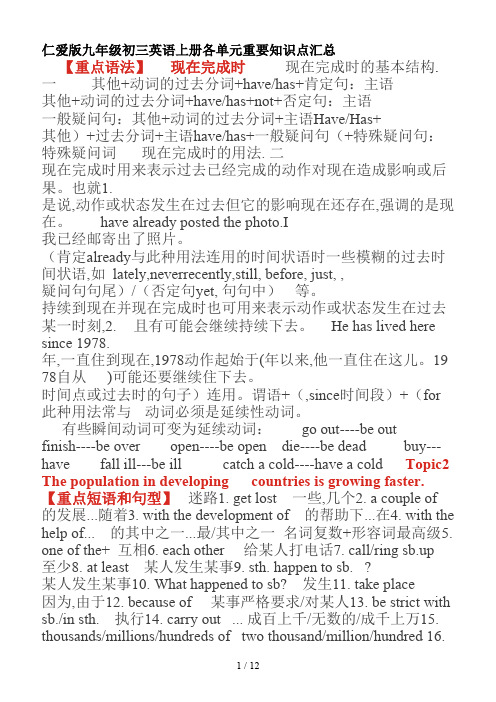
仁爱版九年级初三英语上册各单元重要知识点汇总【重点语法】现在完成时现在完成时的基本结构. 一其他+动词的过去分词+have/has+肯定句:主语其他+动词的过去分词+have/has+not+否定句:主语一般疑问句:其他+动词的过去分词+主语Have/Has+其他)+过去分词+主语have/has+一般疑问句(+特殊疑问句:特殊疑问词现在完成时的用法. 二现在完成时用来表示过去已经完成的动作对现在造成影响或后果。
也就1.是说,动作或状态发生在过去但它的影响现在还存在,强调的是现在。
have already posted the photo.I我已经邮寄出了照片。
(肯定already与此种用法连用的时间状语时一些模糊的过去时间状语,如 lately,neverrecently,still, before, just, ,疑问句句尾)/(否定句yet, 句句中)等。
持续到现在并现在完成时也可用来表示动作或状态发生在过去某一时刻,2. 且有可能会继续持续下去。
He has lived here since 1978.年,一直住到现在,1978动作起始于(年以来,他一直住在这儿。
19 78自从 )可能还要继续住下去。
时间点或过去时的句子)连用。
谓语+(,since时间段)+(for此种用法常与动词必须是延续性动词。
有些瞬间动词可变为延续动词: go out----be out finish----be over open----be open die----be dead buy---have fall ill---be ill catch a cold----have a cold Topic2 The population in developing countries is growing faster.【重点短语和句型】迷路1. get lost 一些,几个2. a couple of 的发展...随着3. with the development of 的帮助下...在4. with the help of... 的其中之一...最/其中之一名词复数+形容词最高级5. one of the+ 互相6. each other 给某人打电话7. call/ring sb.up 至少8. at least 某人发生某事9. sth. happen to sb. ?某人发生某事10. What happened to sb? 发生11. take place因为,由于12. because of 某事严格要求/对某人13. be strict with sb./in sth. 执行14. carry out ... 成百上千/无数的/成千上万15. thousands/millions/hundreds of two thousand/million/hundred 16.s) 具体数字后面不加(百/百万/两千 ... 一半17. half of...三分之二18. two thirds ... 短缺19. be short of 20. so far到目前为止而闻名...因21. be known/famous for而闻名...作为22. be known/famous as ... 幸亏23. thanks to有很长的路要走24. have a long way to go的镇...一个叫做25. a town called... 少于26. fewer than/less than 名胜古迹27. places of interest 感兴趣...对28. be interested in 29. such as ... 例如 ... 尝起来/摸/听/闻/看形容词30.look/smell/sound/feel/taste+ +sb./sth 形容词31. such a/an+物/的人...如此带某人去某地32. take sb. to sp 赶上33. keepup with 做某事很愉快34. have fun doing sth. ...有35. have a population of... 的人口有多少人口?36. What's the population of...? ... 想要做某事37. want to do sth. 讨厌做某事38. hate todo sth 采取措施做某事39. take measures to do sth.时间做某事/有机会40. have(no)chance/time to do sth.过去常常做某事41. used to do sth. 被用来做某事42. be used to do sth. 习惯做某事43. be/get used to doing sth.方面起到显著作用...在44. work well in doing sth.【重点语法】 already, just , yet, ever, never,recently.常用于现在完成时的时间状语: e.g. 1. I have just called you. Have you ever been to France?——2. been to any European countries.——No, I’ve never Have you seen him yet? ——3. Yes, I have seen him already.—— Topic3 The world has changed for the better.【重点短语】用这些钱1. with the money 为了,以致于2. so that ...如此3. so...that... ... 以致于事实上4. in fact/as a matter of fact 来参观在困难时6. in need 决定某事7. decide on sth. 为某人提供某物8. provide sth. forsb./provide sb. with sth.有信心...对9. feel good about... 把某物借给某人10 lend sth. to sb/lend sb. sth. 向某人借某物11. borrow sth. from sb.与此同时12. at the same time 在电话中交谈13. talk on the phone 吸毒14. take drugs 付款15. pay for 给某人买某物16. buy sth.for sb. 在国内外17. at home and abroad 送某人去某地18. send sb. to sp. 派人去请某人19. send for sb. 目的是做某事20. aimto do sth. 决定(不)做某事21. decide(not)to do sth.结束做某事22. finish doing 怎么样?...你觉得23. How do you like.../What do you think of...? 时间做某事...某人花费24.sb.spend st.in doing sth=It takes sb.st. to do sth.钱买...某人花费25. sb.spend some money on sth.=sb.pay some money for sth. 某物表示后者情况与前者一样(表肯定)主语+情态动词/助动词26. so+be/助动词neither/nor+be/表示后者情况与前者一样(表否定)主语+情态动词/表示的确如此情态动词/助动词+/be/主语27. so +【重点语法】表示从过去某一时刻,引导的时间状语连用since或for现在完成时:常与1. 延续到现在。
九上英语(仁爱版)上册重要知识和语法归纳
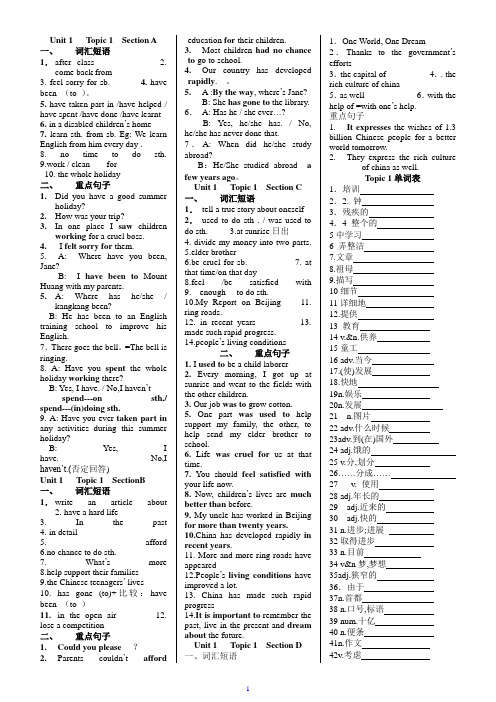
Unit 1 T opic 1 Section A 一、词汇短语1.after class 2.come back from3. feel sorry for sb.4. have been (to )。
5. have taken part in /have helped / have spent /have done /have learnt6. in a disabled children’s home7.learn sth. from sb. Eg: We learn English from him every day .8. no time to do sth.9.work / clean -----for---10. the whole holiday二、重点句子1.Did you have a good summerholiday?2.How was your trip?3.In one place I saw childrenworking for a cruel boss.4.I felt sorry for them.5. A: Where have you been, Jane?B: I have been to Mount Huang with my parents.5.A: Where has he/she /kangkang been?B: He has been to an English training school to improve his English.7.There goes the bell。
=The bell is ringing.8. A: Have you spent the whole holiday working there?B: Y es, I have. / No,I haven’tspend---on sth./ spend---(in)doing sth.9. A: Have you ever taken part in any activities during this summer holiday?B: Yes, I have. No,I haven’t.(否定回答)Unit 1 T opic 1 SectionB一、词汇短语1.write an article about2. have a hard life3. In the past4. in detail5. afford6.no chance to do sth.7. What’s more8.help support their families9.the Chinese teenagers’ lives10.has gone (to)+比较:have been (to )11.in the open air 12. lose a competition二、重点句子1.Could you please----?2.Parents couldn’t affordeducation for their children.3.Most children had no chanceto go to school.4.Our country has developedrapidly. 。
仁爱版英语九年上学期知识点汇总情况

合用文档仁爱版英语上学期知识点汇总(九年级上册 )2017-11-20 卜小兵九年级上册 ( 重点短语、句型和语法)Unit1 The Changing WorldTopic1 Our country has developed rapidly.【重点短语和句型】1. have a good summer holiday暑期过得快乐2. come back from从......回来3. have/has been to去过4. have/has gone to去了5.not...any more 不再 ...6.take photos 照相7.by the way 顺便问一下8.take part in 参加9. around/all over/throughout the world全世界10. tell sb. something about...告诉某人关于某事11. have/live a happy/hard life过着幸福/艰辛的生活12. describe...in detail详细描述13. give support to支持...14. see...oneself亲眼看见15. keep in touch with与...保持联系16.far away 遥远的17.kinds/sorts of 各样各样的 ...18. not only...but also不但...而且...19.make progress 获取进步20.more than/over 多于21. develop/improve rapidly迅速发展/改进22.tell sb. (not ) to do sth. 告诉某人(别)做某事23.ask sb. (not ) to do sth. 要求某人(别)做某事24.in order to do sth. 为了做某事25.have to do sth. 不得不做某事26. It's + 形容词 +for sb. to do sth.关于某人来说做某事是... 的27. why not do sth.为什么不做某事28. succeed/be successful in doing sth.成功地做某事29.dream about doing sth. 梦想做某事30.see/hear sb. do/doing sth. 看见 /听见某人做 /正在做某事【重点语法】现在完成时一 . 现在完成时的基本结构必然句:主语 +have/has+ 动词的过去分词 +其他否定句:主语 +have/has+not+ 动词的过去分词 +其他一般疑问句: Have/Has+ 主语 +动词的过去分词 +其他特别疑问句:特别疑问词+一般疑问句( have/has+ 主语 +过去分词 +其他)二 . 现在完成时的用法1. 现在完成时用来表示过去已经完成的动作对现在造成影响或结果。
- 1、下载文档前请自行甄别文档内容的完整性,平台不提供额外的编辑、内容补充、找答案等附加服务。
- 2、"仅部分预览"的文档,不可在线预览部分如存在完整性等问题,可反馈申请退款(可完整预览的文档不适用该条件!)。
- 3、如文档侵犯您的权益,请联系客服反馈,我们会尽快为您处理(人工客服工作时间:9:00-18:30)。
不规则动词表
一、原形、过去式和过去分词相同的动词(A、A、A型)
cost—cost—cost cut—cut—cut hit—hit—hit
hurt—hurt—hurt let—let—let put—put—put
read—read—read
二、过去式与过去分词相同的动词(A、B、B型)
bring--brought --brought build --built--built burn--burnt--burnt buy—bought—bought catch—caught—caught dig—dug—dug feel—felt—felt fight—fought—fought find—found—found get—got—got hang—hung—hung have/has—had—had hear—heard—heard hold—held—held keep—kept—kept learn—learnt—learnt leave—left—left lend—lent—lent lose—lost—lost make—made—made mean—meant—meant meet—met—met say—said—said sell—sold—sold send—sent—sent shine—shone—shone sit—sat—sat sleep—slept—slept smell—smelt—smelt spend—spent—spent stand—stood—stood sweep—swept—swept teach—taught—taught tell—told—told think—thought—thought win—won—won understand—understood—understood
三、过去分词与动词原形相同的动词(A、B、A型)
become—became—become come—came—come run—ran—run
四、过去时与原形相同的动词(A、A、B型)
beat—beat—beaten must—must--
五、原形、过去式和过去分词都不相同的动词(A、B、C型)
Be (am/is)—was—been be(are)—were—been
Begin—began—begun blow—blew—blown break—broke—broken Can—could choose—chose—chosen do—did—done Draw—drew—drawn drink—drank—drunk drive—drove—driven Eat—ate—eaten fall—fell—fallen forget—forgot—forgotte n
Give—gave—given go—went—gone grow—grew—grown Know—knew—known lie—lay—lain may—might—Mistake—mistook—mistaken ride—rode—ridden ring—rang—rung Rise—rose—risen see—saw—seen shall—should—Speak—spoke—spoken take—took—taken wake—woke—woken Will—would write—wrote—written。
